Alexander Alexandrovich Blok (1880–1921) – the greatest poet, classic of Russian literature of the 19th–20th centuries, playwright. He began his creative career with symbolism, but after the events of the revolution of 1905–1907, social themes began to predominate in his poems. Unlike many poets, during the October Revolution he agreed to cooperate with the Soviet government.
The material was prepared jointly with a teacher of the highest category
Koroshchup Lyubov Alexandrovna.
Experience as a teacher of Russian language and literature - 30 years.
Creation
An interesting fact in Blok’s biography is that the first poems were written by the poet at the age of five. At the age of 16, Alexander Blok studied acting, trying to conquer the stage.
In 1903, Blok married the daughter of the famous scientist D.I. Mendeleev - Lyubov Mendeleeva. Andrei Bely was also very much in love with her, and on this basis a conflict arose between him and Alexander Blok.
The following year, the author’s poems were published for the first time, published in a collection entitled “Poems about a Beautiful Lady.”
In 1909, Blok and his wife went on vacation to Italy and Germany. For his work of that period, Alexander Alexandrovich Blok was accepted into the Academy society, which already included Valery Bryusov, Mikhail Kuzmin, Vyacheslav Ivanov, Innokenty Annensky.
Briefly speaking, Blok’s work contains several directions. His early works are characterized by symbolism. Blok's further poems examine the social status of the people. He deeply experiences the tragic fate of humanity (“The Rose and the Cross”, 1912), then comes to the idea of mandatory retribution (the “Retribution” cycle, 1907–1913, the “Iambic” cycle, 1907–1914). One of Blok’s most famous poems is “Night, Street, Lantern, Pharmacy.”
Blok also had an interest in children's literature, wrote many poems, some of them were included in the collections for children “All Year Round” and “Fairy Tales” (both 1913)
Biography
Blok Alexander Alexandrovich was born in St. Petersburg on November 28, 1880. His father was Alexander Lvovich Blok, who worked as a professor at the University of Warsaw, and his mother was the translator Alexandra Andreevna Beketova, whose father was the rector of St. Petersburg University.
The mother of the future poet married her first husband at the age of eighteen, and soon after the birth of the boy, she decided to sever all ties with her unloved husband. Subsequently, the poet’s parents practically did not communicate with each other.
In those days, divorces were rare and condemned by society, but in 1889, the self-sufficient and purposeful Alexandra Blok ensured that the Holy Governing Synod officially dissolved her marriage to Alexander Lvovich. Soon after this, the daughter of the famous Russian botanist married again for true love: to the guard officer Kublitsky-Piottukh. Alexandra Andreevna did not change her son’s surname to her own or to her stepfather’s intricate surname, and the future poet remained Blok.
Sasha spent his childhood years in his grandfather's house. In the summer he went to Shakhmatovo for a long time and throughout his life he carried warm memories of the time spent there. Moreover, Alexander Blok lived with his mother and her new husband on the outskirts of St. Petersburg.
There has always been an incomprehensible spiritual connection between the future poet and his mother. It was she who revealed to Sasha the works of Baudelaire, Polonsky, Verlaine, Fet and other famous poets. Alexandra Andreevna and her young son studied together new trends in philosophy and poetry, had enthusiastic conversations about the latest news in politics and culture. Subsequently, it was Alexander Blok who primarily read his works to his mother and it was from her that he sought consolation, understanding and support.
In 1889, the boy began studying at the Vvedenskaya gymnasium. Some time later, when Sasha was already 16 years old, he went with his mother on a trip abroad and spent some time in the city of Bad Nauheim, a popular German resort of those times. Despite his young age, on vacation he selflessly fell in love with Ksenia Sadovskaya, who was 37 years old at that time. Naturally, there was no talk of any relationship between a teenager and an adult woman. However, the charming Ksenia Sadovskaya, her image, imprinted in Blok’s memory, later became an inspiration for him when writing many works.
In 1898, Alexander completed his studies at the gymnasium and successfully passed the entrance exams to St. Petersburg University, choosing jurisprudence for his career. Three years after this, he nevertheless transferred to the historical and philological department, choosing the Slavic-Russian direction for himself. The poet completed his studies at the university in 1906. While receiving higher education, he met Alexei Remizov, Sergei Gorodetsky, and also became friends with Sergei Solovyov, who was his second cousin.
Last years of life and death
During the revolution, Blok did not emigrate; he began working in the publishing house of the city of Petrograd. Revolutionary events in St. Petersburg are reflected in the biography of Alexander Blok, in poems, poems (“The Twelve,” 1918), and articles.
Before his death, the poet was often ill. The Politburo of the Central Committee of the RCP(b) responded with refusals to the request to leave the country for treatment and the subsequent petition of Maxim Gorky. After this decision, Blok refused to take food and medicine and destroyed his notes.
Living in Petrograd amid poverty, Alexander Blok died of heart disease on August 7, 1921.
Biography of Alexander Blok
Alexander Blok is considered a poet of the Silver Age.
Alexander Blok had a colorful life, and his work left a huge imprint on world literature. The poems of this poet are on the list of the 100 best literary works in the world.
As a hobby, Alexander Alexandrovich Blok participated in drama productions in the theater and even saw himself as an actor, but literature attracted him more.
For 2 years, Blok was a direct participant and witness of revolutionary demonstrations and rallies.
Upon returning from the army, this writer worked in the Extraordinary Investigative Commission for the Affairs of Tsarist Ministers. There he was in the position of stenographic report until 1921.
Childhood and youth
Alexander Alexandrovich Blok was born into a respected and intelligent wealthy family in 1880. All the relatives of this poet were engaged in science. The poet's father was a philosopher and professor of law, and his grandfather was a famous botanist.
When Blok's parents divorced, the future poet remained to live in his grandfather's house. It was a rich estate with fragrant gardens and a huge library. In winter, the boy lived in St. Petersburg, and in the summer they came to the Moscow region to the dacha. Everything in that house was saturated with literature. Saltykov-Shchedrin, Dostoevsky and Turgenev were there at one time.
At the age of 9, the poet began to “release” the monthly publication “Ship”, which fit in an ordinary notebook. Later, he became the editor of the home-written Vestnik, in the publication of which all Blok’s relatives took part.
Read also: Interesting facts about the life of Fyodor Dostoevsky, biography, family, creative heritage
From childhood, his parents protected Blok from everything bad. That is why, at the age of 11, entering the Vvedenskaya gymnasium, which was located on the edge of St. Petersburg, became a quiet horror for him. From a friendly, calm home environment with conversations about art, the boy ended up in a loud place with a crowd of screaming boys with short hair. A visit to this educational institution was like a duty for the boy, and he made his first friends only in high school.
In 1898, after graduating from high school, Alexander Blok began studying at the Faculty of Law. He made this decision thoughtlessly and quickly, and therefore the brilliant poet quickly realized that he was not drawn to jurisprudence. After 4 years of study there, he had to transfer to the Faculty of Philology and History.
During his studies, the young man became interested in theater. He played on stage, and later became seriously involved in philosophy. Over time, literary talent took its toll, and Alexander Blok took up writing poetry.
Mature age
Upon completion of his studies at the university, a new page opened in Blok’s life. It was then that success as a writer came to him and his growth as a poet began. Alexander Alexandrovich Blok gained fame, and fans of his work appeared throughout the country. In 1907, his poetry collection “Unexpected Joy” was published, and in 1908, “Earth in the Snow.” In 1909, Blok wrote a drama called “Song of Fate,” but it was not staged in the theater.
In 1909, Alexander Blok began traveling around the cities of Italy and Germany, which ultimately inspired the poet to publish a series of works called “Italian Poems.”
During the First World War, the poet served in an engineering and construction squad that specialized in the construction of fortifications in the Pinsk swamps. At this time, Blok received the news about the end of the era of autocracy in Russia.
In May 1917, the poet took an active part in the investigative commission, the purpose of which was to investigate the activities of tsarist officials. Based on the interrogation materials, Alexander Alexandrovich wrote the book “The Last Days of Imperial Power” at that time.
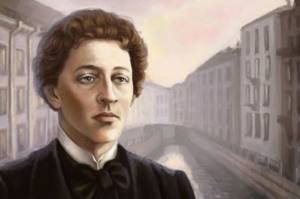
last years of life
The last performance of Alexander Blok, who presented his own poems, took place a couple of months before his death. Then the atmosphere in the Bolshoi Theater was so oppressive and gloomy that the audience loudly compared the poet’s creative evening with a wake.
Read also: Interesting facts about the life of Arkady Gaidar, biography, personal life, creative heritage
Alexander Alexandrovich suffered from cardiovascular diseases. He developed this illness due to constant mental and physical stress. Later he developed asthma, and in 1920 the poet fell ill with scurvy.
To treat all these diseases, the man needed to go to Finland, but he was not given permission to do so. After many attempts, the Soviet government finally gave in and gave the go-ahead for the poet to leave the country, but it was too late: the disease had progressed.
Alexander Blok died in the summer of 1921. The poet's death caused a public outcry.
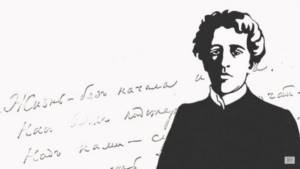
Interesting Facts
- One of Blok’s most famous poems “Night, street, lantern, pharmacy...” is depicted as a monument on the wall of a house on one of the streets of the Netherlands as part of the worldwide “Wall poems” project.
- The name Alexander Blok was given to asteroid 2540, discovered in 1971.
- There is an opinion that for some time before his death the poet was delirious or even went crazy. He was obsessed with the thought of whether all copies of the poem “The Twelve” had been destroyed. However, the poet died in a clear mind, which refutes these rumors.
- see all the interesting facts from Blok’s life
Creative heritage
Blok wrote 417 poems throughout his life. His poems were published in collections. In total, Blok published 29 collections of poetry.
Direction of creativity
The bloc joined the Symbolists. Followers of this literary movement appreciated the poems of this poet. His first collection was published by the Symbolist publication “Grif”. It was the book “Poems about a Beautiful Lady.” Blok debuted his poetry book in 1904, a year after the wedding.
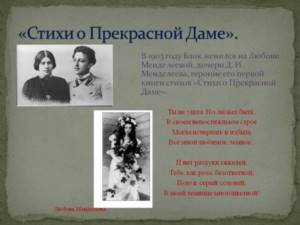
If you study the facts about Blok’s poetry, it becomes clear that over time the poet began to move away from the ideas of symbolism. Then he became interested in the real life that was raging in Russia in those years. A whole layer of Alexander Blok’s work was dedicated to the revolutionary movement. Poems of that time sent readers to ordinary people. They described the problems faced by factory workers.
The period from 1906 to 1908 was the most successful stage of Blok's life. During this period, several collections of this poet were published at once, and a play based on his play “Balaganchik” was staged. Alexander Alexandrovich was then engaged not only in poetry, but also wrote criticism.
Main themes of creativity
- The fate of individual people and the Motherland in the most important eras of history.
- The revolutionary process and the role that the intelligentsia played in it.
- Loyalty in friendship and love.
- Fate, fate, feelings of anxiety before approaching hopelessness.
- The place of the poet in the social world.
- The connection between nature and man.
- Belief in the highest and the universe.
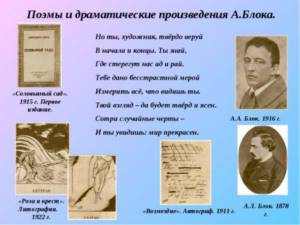
Personal life
In 1897, Alexander Blok fell in love for the first time. Then the object of his sympathy became a beautiful and well-known woman in society, Ksenia Sadovskaya. The young people met at a resort where the girl was recovering her health after giving birth to a child. At the time of meeting the young man, she was already married and was raising 3 children with her husband.
Read also: Interesting facts about the life of Sylvester Stallone, biography, career, film roles
Alexander Blok married in 1903. His chosen one was Lyubov Mendeleeva, the daughter of the great scientist. For Blok, his wife was the ideal of beauty, and he treated her as a fragile and exquisite creature. There was no intimate relationship between the spouses. The poet explained this by saying that he did not want to sink to the level of a “yard wench,” as his wife had fallen. This did not suit Lyubov Mendeleeva herself, and therefore she had to satisfy her carnal needs with Alexander Bely. Blok also regularly cheated on his wife. At the same time, the couple claimed that they were madly in love with each other.
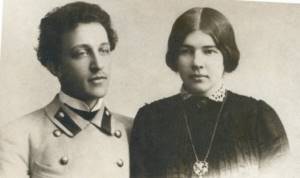
Blok's marriage to Mendeleeva was childless and lasted 18 years.










